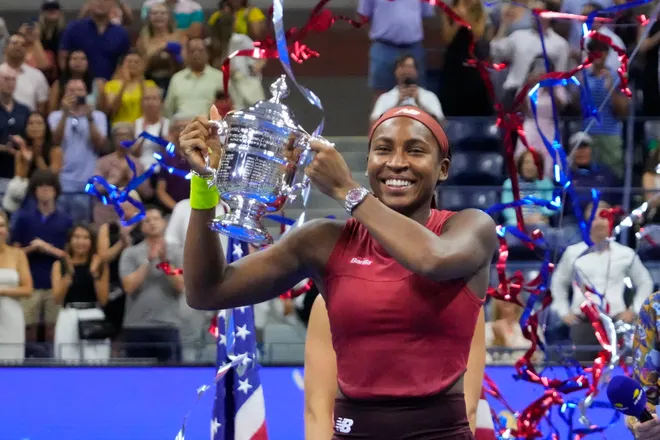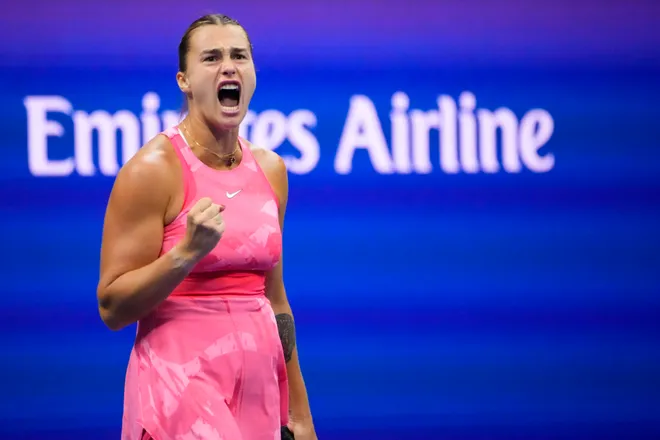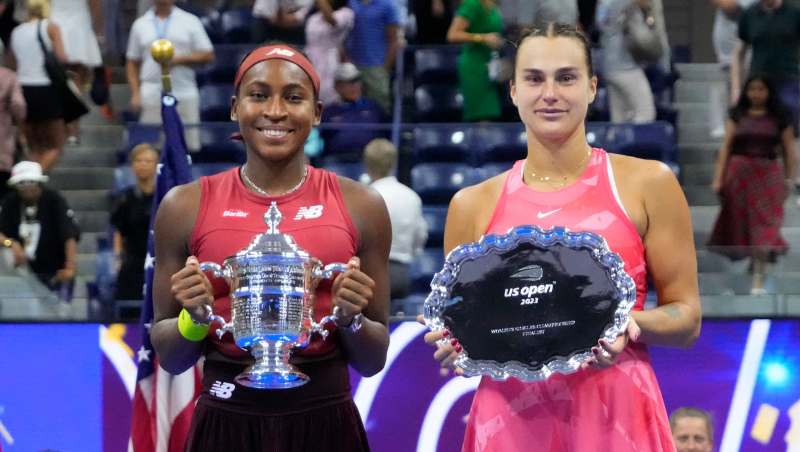American teen Coco Gauff wins US Open women's final for first Grand Slam title
NEW YORK — It was merely a matter of time before Coco Gauff won a Grand Slam title. But six weeks ago, nobody — including the 19-year old Gauff herself — would have imagined it would happen at this US Open.
Coming off one of the low points in her young career following a first-round exit at Wimbledon, Gauff hired a new coaching team and started the hard court season with low expectations. But after winning 18 of 19 matches, including the seven that mattered most at this tournament, she is now forever a major champion.
Gauff defeated Aryna Sabalenka of Belarus on Saturday, 2-6, 6-3, 6-2, shrugging off a shaky start and making all the right adjustments to slowly assert control of the match. With the win, Gauff became the third American teenager to win the US Open women's final, joining Tracy Austin in 1979 and Serena Williams in 1999.
GAUFF: Takes the reins of her tennis career, but her parents remain biggest supporters
"It doesn't get more dramatic than that to be honest," Gauff said. "I don't think it can be put into words."
Sabalenka, who won the Australian Open in January and exits the US Open as the new world No. 1, found herself confused about how to react as Gauff’s relentless defense and elite court coverage made her hit extra balls from uncomfortable positions
Sabalenka, who owns arguably the most powerful baseline game in women's tennis, committed 46 unforced errors and lacked the necessary consistency to finish points and put Gauff away as the match wore on.
"The first set I was dealing with my emotions quite good," Sabalenka said. "I was focused on myself, not on the crowd or the way she moves. Definitely she was moving just unbelievable today. Then the second set I start probably overthinking, and because of that I start kind of like losing my power. Then she start moving better. I start missing a lot of easy shots."
Perhaps the best example came on the second point of the final set with Sabalenka moving Gauff from side-to-side until she finally got a short ball that she could hammer into the backhand corner. But with Gauff blazing a trail from sideline to sideline, she managed to get a lob just deep enough to test Sabalenka’s footwork. Stumbling backwards, Sabalenka smashed it into the bottom of the net.
Gauff would go on to win that game to open the third set with a break, and she added another for a 3-0 lead as Sabalenka seemed unable to find another gear, continually attempting to hit harder and harder but without the ability to hang in rallies.

It was a performance reminiscent of many in Sabalenka’s career where her commitment to playing offensive tennis all the time led to wild swings at the ball that crumbled under pressure.
"I got over-emotional," Sabalenka said.
It certainly didn’t seem like that’s how this match would end after the first set, when Sabalenka managed to target the Gauff forehand — arguably her biggest weakness — and control the middle of the court.
After Sabalenka won the first set relatively easily, it seemed this match may be similar to Gauff’s first Grand Slam final when she lost 6-1, 6-3 to Iga Swiatek at the French Open last year.
US OPEN: Tennis balls serving up controversy, and perhaps, players' injuries
But this is a new version of Gauff — one who is more mentally mature and tactically aware of how to turn matches around. In this US Open, Gauff had to come back three times from losing the first set and played another three-setter against Caroline Wozniacki, who seemed to have all the momentum after evening their fourth-round match.
"I knew today was going to be one of those problem-solving tough matches because she's a tough opponent," Gauff said. "I knew I wasn't going to be able to win this match the way I like to play."
It would have been difficult to see Gauff having that kind of patience and emotional endurance earlier this year when she was struggling to hang with higher-ranked opponents and failing to make deep runs in the first three Grand Slams.
After Wimbledon, Gauff acknowledged that something needed to change and brought ESPN commentator Brad Gilbert onto her team alongside recently-hired Pere Riba. Gauff admitted this week that the coaching change was made with an eye more toward 2024, as there’s little time during the season to execute big changes.
But a few small adjustments in her game, a clearer tactical plan and perhaps most of all a renewed sense of confidence changed the trajectory of Gauff’s career in a matter of weeks. Tournament titles in Washington, D.C., and Cincinnati made Gauff one of the favorites for the US Open.
Despite that spotlight of playing in her home country, Gauff was the tournament’s toughest competitor and showed it again in the final by raising her level and putting the onus on Sabalenka to see if her big cuts at the ball would hold up under pressure.
They did not.

ARYNA SABALENKA is a powerful, and complicated, opponent in US Open final
The turning point came early in the second set when one loose game from Sabalenka, which ended with a double fault, gave Gauff a 3-1 lead and the opening she needed to make the crowd a factor.
Feeding off that confidence, Gauff’s shots starting coming with significantly more pace and depth than in the first set, finally taking away some of Sabalenka's time.
Sabalenka had opportunities to retrieve the break, but a handful of key misses — including a short ball forehand at deuce in the very next game — allowed Gauff to stay in front the rest of the way.
"The first set I was hitting balls so short and I was, like, 'why are they going so short?'" she said. "My team was telling me to get depth, and I was, like, 'I'm trying.' It was hard to redirect the ball where I wanted to go because she's always on the front foot, always hitting so fast.
"I was just trying to stay in the match. I don't like to play the way that I played today. Running around the court, it's fun, but, you know, it's not as fun as hitting winners. But I knew going into the match that was going to have to be the way I was going to have to play today against her."
Gauff might have started to feel the moment when Sabalenka took a medical timeout trailing 4-1 in the set. Gauff dropped her serve immediately after the break but regrouped right away to break Sabalenka for the fifth time in the match and get the cushion she needed to finish her maiden Grand Slam title.
"Even when I lost the first set I still felt I was into the match," Gauff said. "And I said, you know, I'm going to give it my all. Whatever happens happens. Even on that match point, 40-Love, technically the match was on my racquet. It didn't feel like I had it won. It was crazy. I was just trying my best to just focus on the point ahead of me."

Disclaimer: The copyright of this article belongs to the original author. Reposting this article is solely for the purpose of information dissemination and does not constitute any investment advice. If there is any infringement, please contact us immediately. We will make corrections or deletions as necessary. Thank you.







